BRICS 2023: President Isaias Afwerki Orchestrates Historic Meetings in Africa as the World Shifts from UN to African Soil
President Isaias Afwerki strengthened international ties at the BRICS Summit, engaging with leaders for collaborative opportunities.
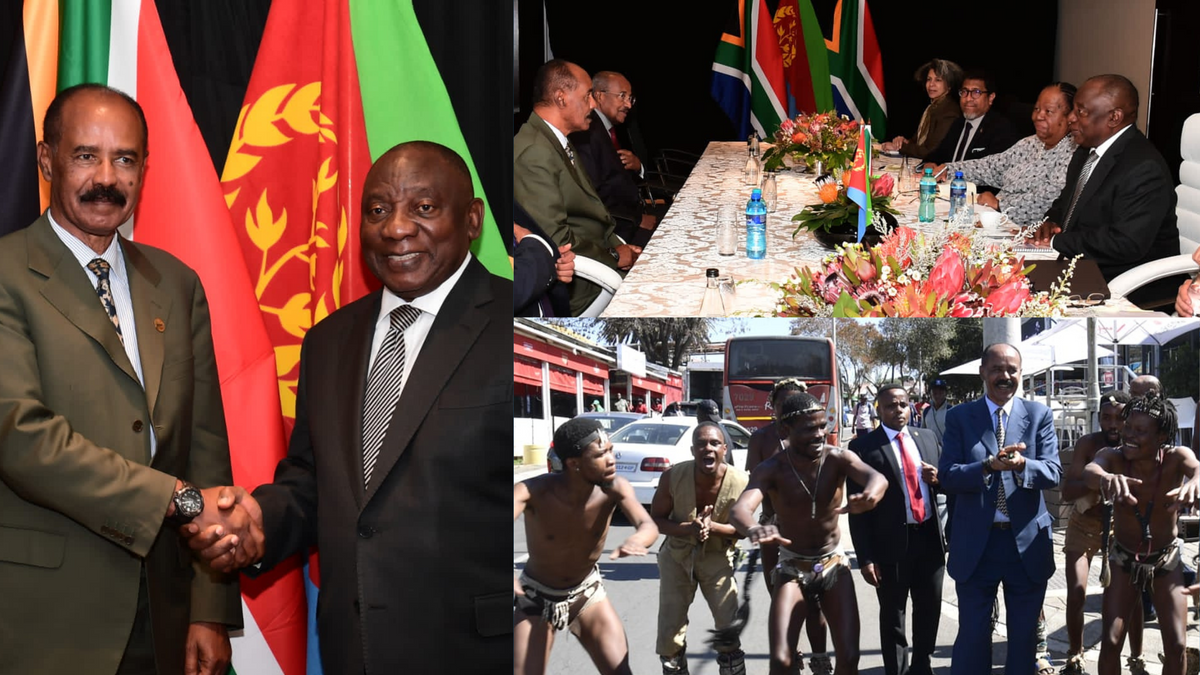
In the early hours of the morning, President Isaias Afwerki of Eritrea embarked on a meaningful journey to South Africa, answering the invitation extended by President Cyril Ramaphosa to attend the BRICS 2023 Summit scheduled for August 24th. Accompanying President Afwerki was a delegation of officials, including the esteemed Foreign Minister Osman Saleh.
With anticipation hanging in the air, the Eritrean presidential aircraft gracefully touched down at the O.R. Tambo International Airport in Johannesburg earlier in the day. The excitement surrounding the upcoming summit was palpable. Among the dignitaries present to warmly welcome President Afwerki was South African Minister of Health Joe Phaahla, who extended a heartfelt reception to the visiting leader.
During his visit, President Afwerki embarked on a journey with historical significance. The delegation paid a solemn visit to the Nelson Mandela Museum, a tribute to the legacy of the anti-apartheid revolutionary and former South African President. The expedition continued through the vibrant streets of Soweto, where the local community eagerly awaited, expressing their warmth through traditional music and dances that encapsulated the goodwill cultivated through these interactions.
During President Afwerki's visit, his bilateral meeting with President Cyril Ramaphosa was pivotal. Set against the backdrop of the 15th BRICS Summit, these two leaders engaged in discussions that revolved around matters of mutual interest and collaboration, underlining the cooperative spirit of the event.
However, the diplomatic dialogues continued as President Afwerki took advantage of the occasion to hold sideline meetings with prominent leaders. He participated in substantive conversations with President Salva Kiir and Chadian PM Saleh Kebzabo, exploring avenues of cooperation within the framework of the summit's objectives.
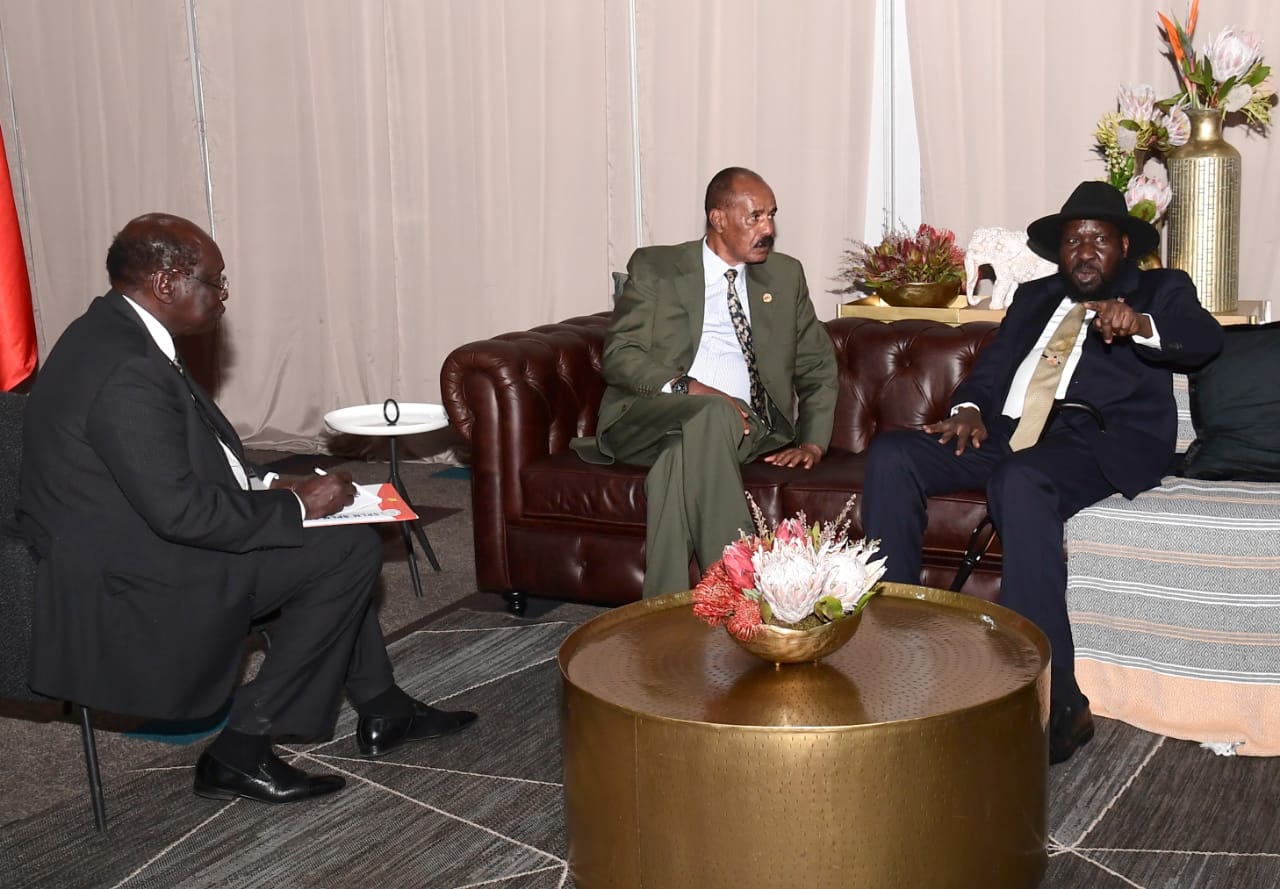
Accompanying President Isaias Afwerki is Minister Saleh, who has been a consistent presence as an integral part of the Eritrean delegation for years, playing a crucial role in fostering international connections. President Isaias engaged in a meaningful exchange with Foreign Minister Sergei Aleinik of Belarus, aiming to identify common ground and strategies to enhance the bilateral relations between the two nations.
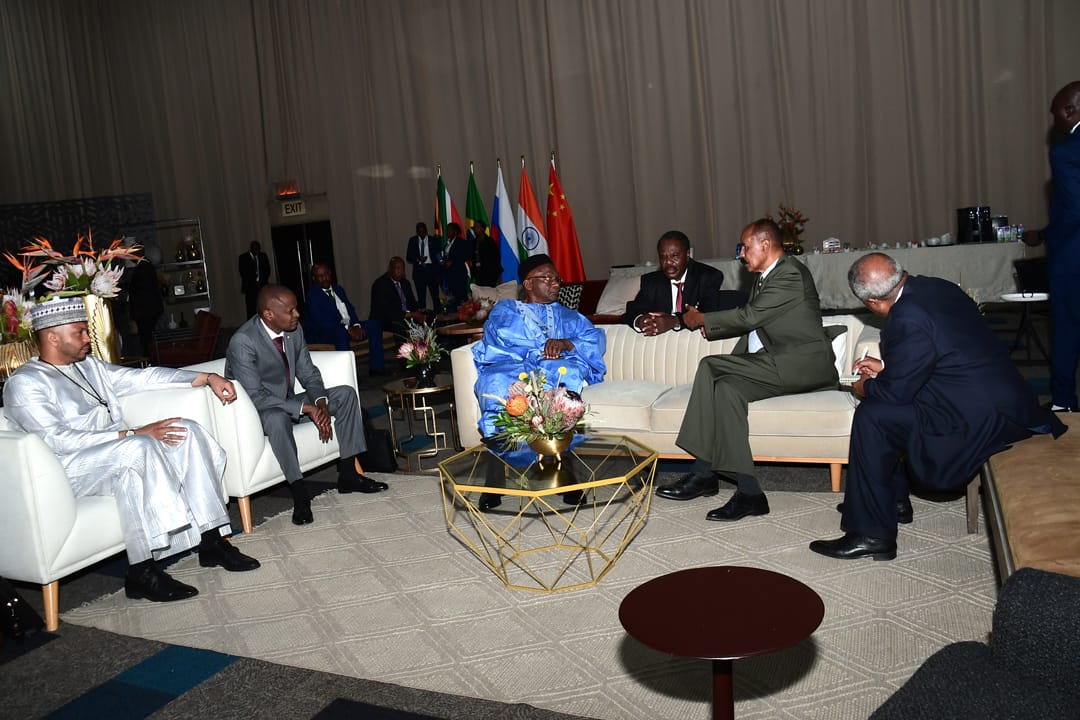
What common ground can Eritrea and Belarus share? The possibilities for collaboration in areas such as potash, tourism, security, and trade have revealed a promising prospect for their partnership.
Continuing his dedication to fostering international relationships, President Afwerki participated in conversations with Foreign Minister Yvan G of Venezuela, further solidifying his commitment to strengthening ties with the country. Amidst the vibrant atmosphere of the BRICS Summit, the two leaders reaffirmed the robust connections between Eritrea and Venezuela. Their dialogues centered on exploring collaborative possibilities within this evolving multipolar global landscape.
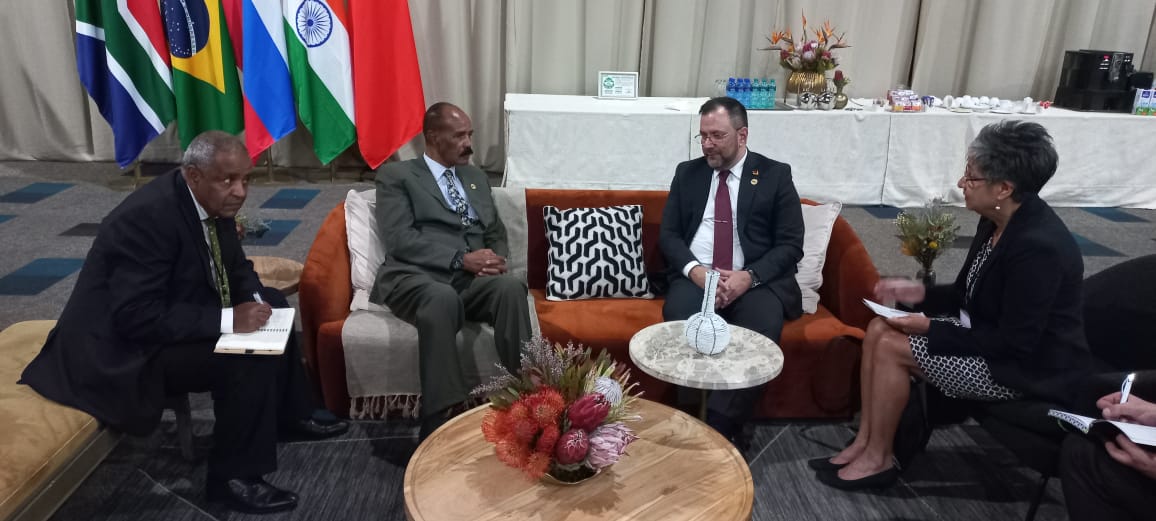
As President Isaias Afwerki's participation in the BRICS Summit unfolds, it becomes evident that this diplomatic journey transcends mere discourse. It represents an opportunity to fortify existing relationships, establish novel partnerships, and contribute to a more interconnected global landscape. With each engagement, President Afwerki reaffirms Eritrea's position as a valuable and proactive contributor on the international stage, poised to engage in meaningful cooperation to usher in a brighter future.
Moreover, the summit reached its pinnacle with President Isaias Afwerki delivering a poignant address to the assembly of BRICS nations, set against a backdrop that inspired awe.
During his speech, President Isaias conveyed his profound gratitude to the host nation, South Africa. The warm reception and camaraderie among member nations resonated deeply with the essence of unity and a shared determination to tackle urgent global challenges.
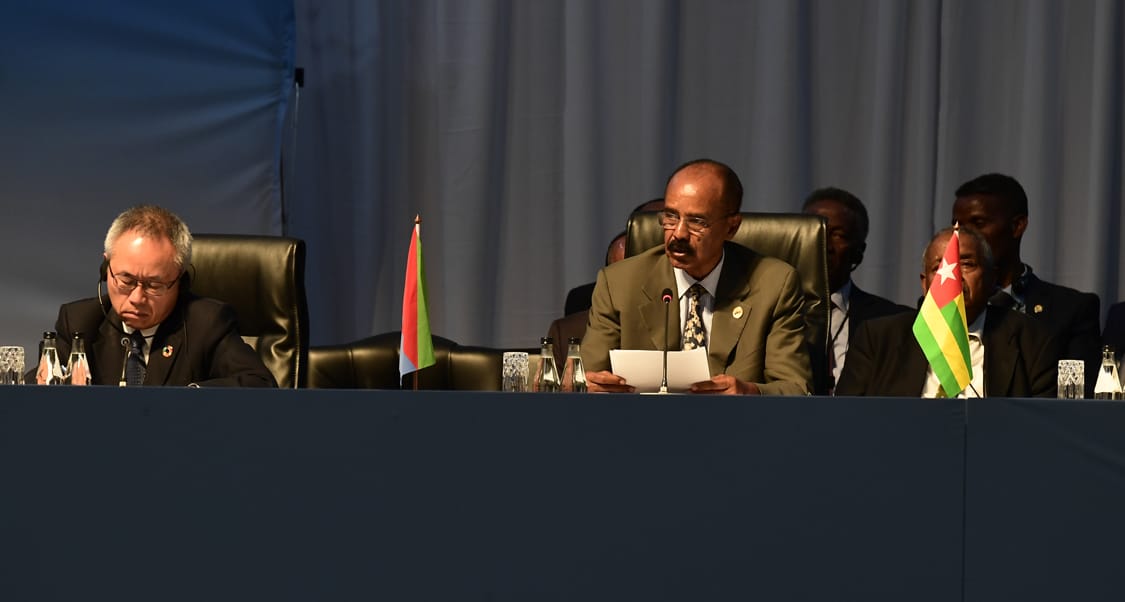
President Isaias further elaborated that with the world at a crucial juncture, convening the 15th BRICS Summit under the guidance of its visionary leaders provided a meaningful opportunity for introspection on the intricate challenges and promising prospects of global governance. The warm reception extended by South Africa, as the gracious host nation, not only echoed the spirit of unity but also highlighted the urgency of addressing the prevailing deficiencies within the global system.
In his address, President Isaias stated that as we navigate these complexities, it becomes paramount to meticulously scrutinize the shortcomings entrenched within the existing global governance framework and envision a future defined by principles of justice and equity.
President Isaias further expounded on the shortcomings of the current global governance structure, asserting that at the core of this discourse lies the recognition of inherent inadequacies in the contemporary global governance architecture. This structure, characterized by its dysfunctionality, lack of inclusivity, and unjust rules and regulations, prompts a need to question its efficacy in fostering genuine international collaboration. The concept of US exceptionalism, often identified as PAX AMERICANA, has exerted significant influence over global progress for almost a century, occasionally leading to unforeseen consequences. The era of bi-polarity following World War II and subsequent attempts at establishing uni-polarity have given rise to a series of conflicts and enduring instability. These dynamics have obstructed opportunities for meaningful partnerships among nations, disregarding the shared interests and aspirations that unite diverse societies.
Regarding pursuing an equitable global order, President Isaias highlighted that amidst these challenges, the international community ardently desires a global order characterized by justice, compassion, and strict adherence to the rule of law. The remarkable technological advancements of the past two centuries should have been celebrated as a collective public good, ushering transformative improvements in the quality of life for all humanity. Nevertheless, this potential remains unrealized due to power imbalances and the need for more inclusivity in shaping international agendas. The call for justice extends beyond mere economic considerations – it encompasses respect for national independence and sovereignty and the establishment of societies founded on compassion and social justice principles.
President Isaias embraced the BRICS Summit as a defining moment, stating that the recent gathering of BRICS nations hosted by South Africa signifies a pivotal shift in global dynamics. The economic collaboration among Brazil, Russia, India, China, and South Africa transcends the realm of trade; it signifies the ascent of Africa's influence on the world stage. The choice of South Africa as the summit's host nation accentuates its growing role as a key player in international affairs, acknowledging the significant potential for economic growth and innovation that Africa contributes to the global arena.
Acknowledging the challenges of global escalation, President Isaias underscored the pressing concern of the escalating conflict in Ukraine, driven by the United States and NATO. This dangerous path not only jeopardizes regional stability but also underscores the potentially catastrophic consequences of unchecked escalation. Such actions arise from a desperate pursuit of dominance and superiority. Nonetheless, history has taught us that such approaches often lead to unintended global upheaval, leaving nations grappling with the aftermath of devastation and instability.
President Isaias advocated for a collaborative approach toward concrete objectives in the face of these challenges. He emphasized the imperative of coordinated efforts, mainly by international organizations like BRICS, in articulating and formulating concrete goals and strategies. The ongoing de-dollarization measures offer a pathway to counter repressive actions. However, they should be accompanied by initiatives fostering consensus, preventing conflicts, and ensuring global stability. Mechanisms for expedited and equitable conflict resolution must be explored, combined with rectifying weaponized instruments that violate international law.
Highlighting the reclamation of a legitimate global governance paradigm, President Isaias asserted that in a world characterized by uncertainty, the path forward is one of collaboration and unity. Tangible steps toward rectifying global imbalances can be achieved by aligning efforts with the principles of BRICS and similar platforms. As the pursuit of a just global order continues, it becomes vital to address systemic issues that compromise the fundamental tenets of international law and the UN Charter. Through the pursuit of coordinated, ethical, and lawful actions, a path toward a future characterized by cooperation, equality, and justice can be carved out.
President Isaias Afwerki's diplomatic journey during the 15th BRICS Summit in South Africa was broader than just political discussions. Amid the robust exchange of ideas and collaboration among leaders, President Afwerki and his delegation also took the opportunity to explore innovative initiatives that hold the promise of transforming lives. Later in the day, following his engagements at the summit, President Afwerki and his delegation visited the Hydraform Technological Plant in the environs of Johannesburg.
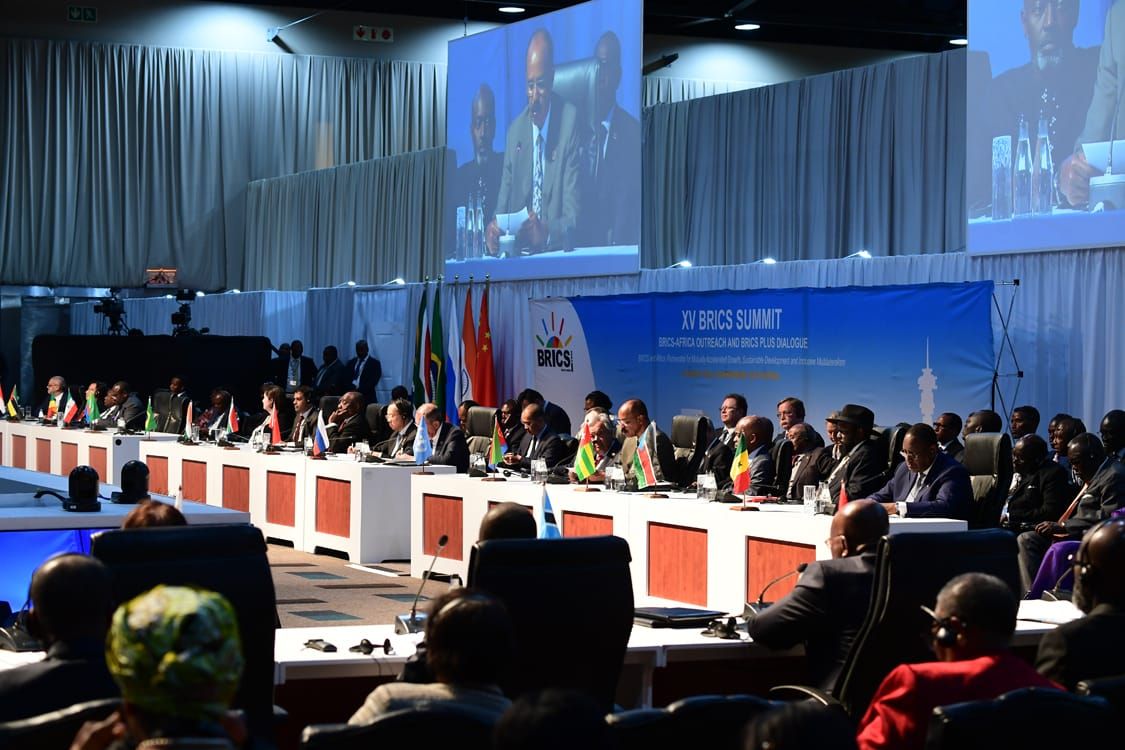
The Hydraform Technological Plant is a testament to cutting-edge advancements in housing construction materials. President Afwerki's visit to this plant highlights his commitment to exploring innovative solutions that address critical societal challenges, including housing shortages. The plant specializes in developing advanced construction materials and methods, prioritizing sustainability, efficiency, and affordability.
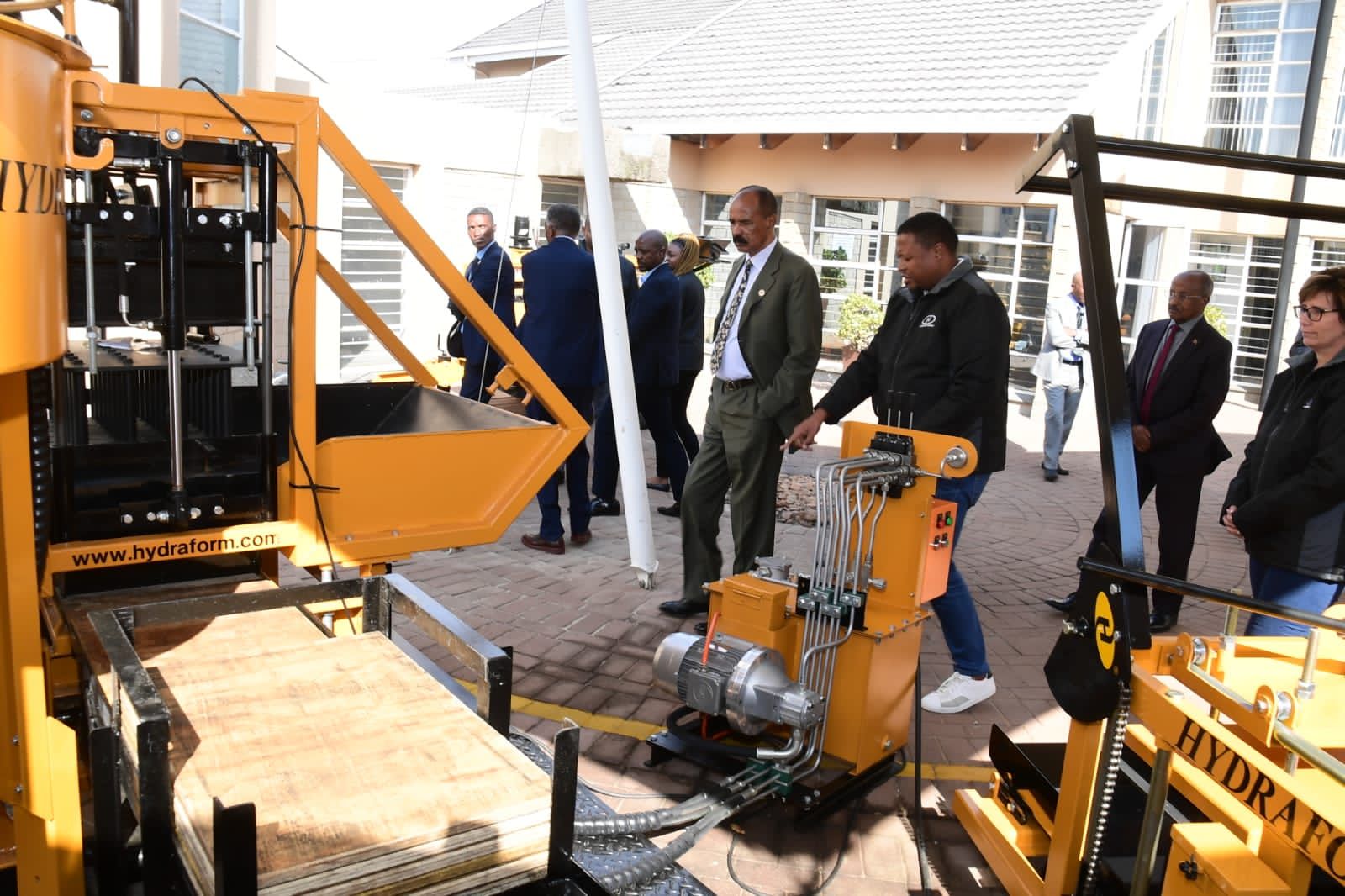
During his tour of the Hydraform Technological Plant, President Afwerki had the opportunity to witness firsthand the transformative potential of such technologies in revolutionizing housing construction. The emphasis on sustainable and cost-effective building materials aligns with the broader objectives of enhancing living standards and fostering economic development.
In conclusion, President Isaias emphasized that the deliberations and insights drawn from the 15th BRICS Summit underscore the urgent need to reassess global governance. Acknowledging the inherent imperfections within the current system and charting a course toward a more equitable and just world order requires active engagement from all nations and international organizations. Using collaborative endeavors, consensus-building, and an unwavering commitment to ethical principles, redirection away from conflict and instability and toward a future marked by shared progress, compassion, and mutual respect for all can be envisioned.
Visit Africa and encourage tourism in Africa
If you like what you read and want more subscribe and donate to Nefasitpost.Com

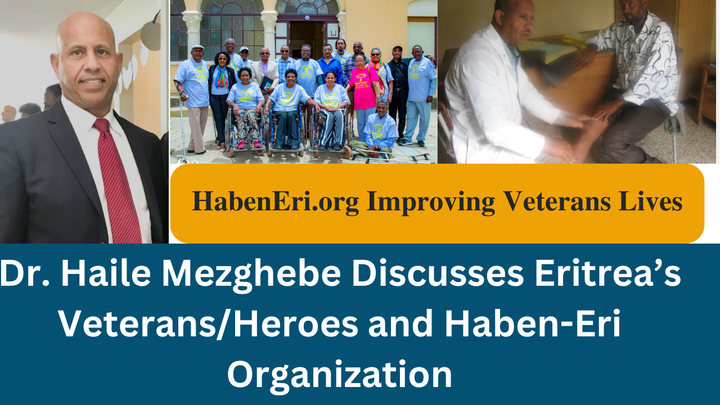
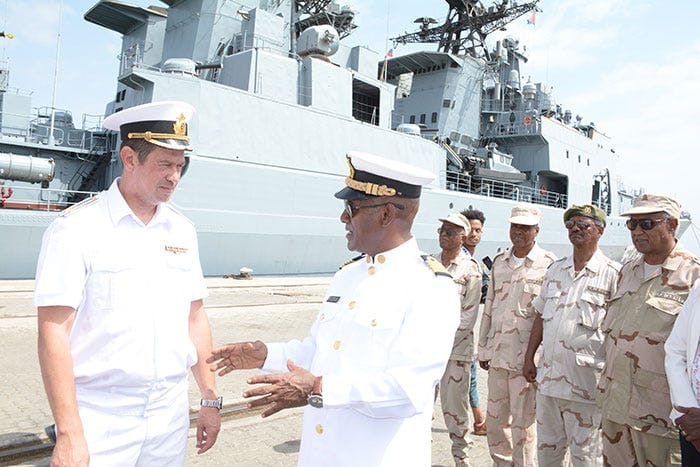
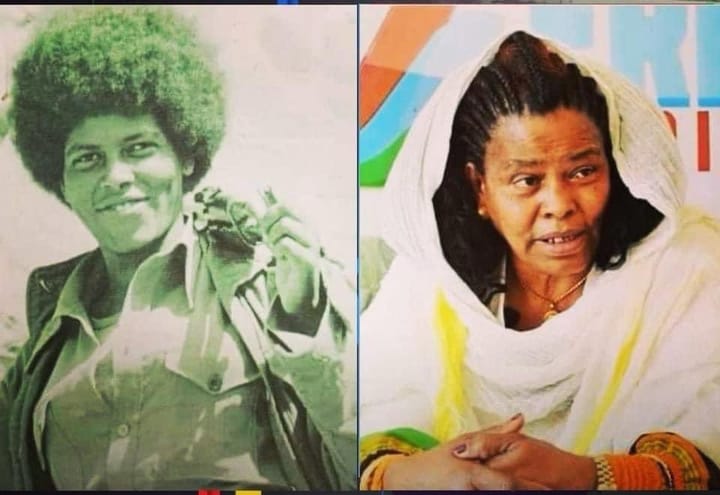
Comments ()